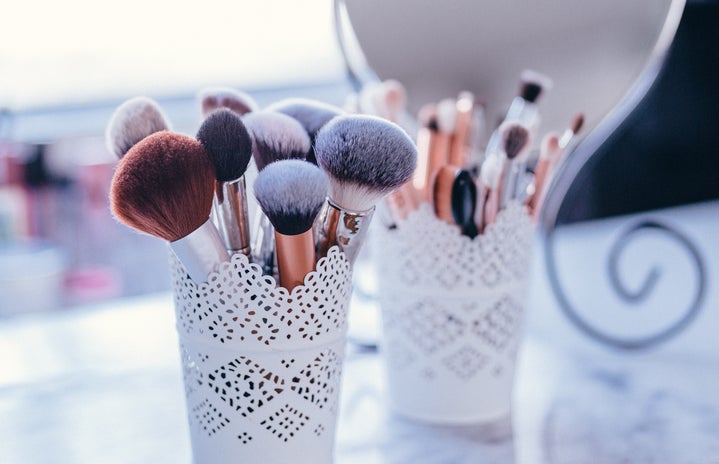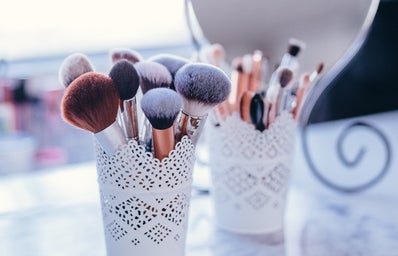“I want to look older faster!” said nobody ever. Although aging is an inevitable part of life, there are destructive habits you may have that are causing you to age faster. And we’re talking about the possibility of wrinkles and risks of cancer even in your 20s… Yikes!
According to Dr. Sarika Ramachandran, a dermatologist at the Ronald O. Perelman Department of Dermatology at New York University, the skin is an outward reflection of your inner and general health. Thus, an unhealthy lifestyle causes a lot of accelerated aging such as wrinkles and sagging earlier than normal, and you may not only be causing yourself to look older faster, but also shortening your lifespan by putting your long-term health at risk. Her Campus spoke with Dr. Ramachandran to help warn collegiettes about the 5 worst habits that could be aging you sooner than you’d like!
Bad Habit #1: Not Applying Sun Protection Year-Round (Yes, that also means winter!)
The sun can make us feel nice and warm and can even provide us with some Vitamin D, but without proper protection from its harmful ultraviolet rays (UV rays) we may be doing more harm than good. According to the American Association of Dermatology (AAD), unprotected exposure to UV light damages fibers in the skin called elastin. When these fibers are broken down, the skin’s tightness starts to be broken down as well. It can start to sag, stretch, and lose its ability to go back into place after stretching. The skin will also be more prone to bruises and tears that take longer to heal. Not staying protected will cause prematurely damaged and aged skins as well as put you at risk for certain skin cancers.
Dr. Ramachandran says, “Using sun protection from an early age is really important. Since UV rays exist year-round and can even pass through clouds, it’s important to use sunscreen year-round even in the winter months.” Both snow and sand reflect the sun’s UV rays, the snow by 80% and sand by 20%. She also recommended staying under the shade, wearing tightly woven or darker clothes, and using an umbrella especially on particularly hot, sunny days in addition to applying sunscreen.
But what kind of sunscreen should you be using? Dr. Ramachandran says that the official recommendation from the AAD is to use a sunscreen with a SPF of 30 or greater, although any amount of SPF at least 15 or greater can be helpful. She noted that one should get a broad-spectrum sunscreen, meaning it protects from both UVA and UVB rays, which can both negatively affect skin. UVA rays can even pass through window glass, so this kind of sunscreen keeps you protected even indoors on sunny days. In terms of application, Dr. Ramachandran says the best time to apply daily sunscreen is in the morning after you shower or wash your face. Make sure to cover as much of your exposed body as you can. Certain facial moisturizers with SPF as opposed to regular sunscreens may be friendlier to the more sensitive skin on your face. We recommend Clinique Sun Broad Spectrum SPF 50 Sunscreen Body Cream ($23) for your body and Cetaphil Daily Facial Moisturizer for All Skin Types, SPF 50 for your face.
Bad Habit #2: Going Tanning
According to the American Academy of Dermatology, over a million Americans, 70% of whom are girls and women ages 16 to 29, visit a tanning salon daily. This is absolutely horrifying considering that tanning has been associated with a significant increase of risk for melanoma, which Dr. Ramachandran pointed out is the deadliest form of skin cancer. She says, “Tanning may provide short-term color, but that extra exposure to UVs can really translate to early photoaging and skin cancer. It really accelerates photoaging by causing the formation of premature wrinkles and freckles since you’re exposing yourself to uninterrupted, concentrated ultraviolet light.”
Perhaps the orange, I mean olive, tone isn’t worth the saggy, wrinkled, dry skin sure to catch up to you. Not to mention the formation of cancerous cells! Why not try Sephora’s St. Tropez Bronzing Lotion ($30) instead to achieve that warm glow you really want without putting yourself at risk by UV light exposure. Its Aromaguard™ fragrance technology eliminates the telltale self tan aroma by a minimum of 70%, and it’s also an Allure Best of Beauty Award Winner!
[pagebreak]
Bad Habit #3: Smoking
I’m sure we’ve all been warned since those days of health class in middle school that smoking damages all sorts of vital organs such as the lungs, heart, and brain. However, what most people don’t know is that smoking is also linked with skin aging. Dr. Ramachandran recommends that no collegiette should ever smoke just as she believes no collegiette should ever go tanning. She says that smoking decreases the oxygen available to the skin, which can accelerate wrinkles and photoaging. According to Dr. Lowell Dale from the Mayo Clinic, the nicotine in cigarettes causes the blood vessels in the outermost layers of skin to narrow, impairing blood flow. The skin doesn’t get enough oxygen and important nutrients such as vitamin A as a result. He also noted that many of the more than 4,000 chemicals in tobacco smoke can damage collagen and elastin, causing wrinkling and sagging aggravated by facial expressions while smoking. Dr. Ramachandran also says that there have been links between smoking and certain types of skin cancers.
If you find yourself indulging in this deadly and aging habit, it’s a good idea to talk to your doctor or health center at college about possible options to help you quit! There are a lot of products out there to help with this, but since most are targeted for an older audience, it’s a smart idea to ask your doctor about them before giving them a go on your own. Also, check out Not-on-Tobacco, the American Lung Association’s voluntary program to help teens quit smoking.
Bad Habit #4: Not Getting the Right Balance of Vitamins, Minerals, and Water
Because the skin is so affected by our general health, Dr. Ramachandran says that it’s important to have a balanced amount of vitamins and minerals. When we are deficient of certain vitamins or have too much of one and not enough of another, the skin definitely gets affected. She says that keeping your body nourished properly will lead to healthy, shining skin. Likewise, a poorly nourished body will lead to unhealthy, prematurely aged skin.
Some important vitamins for a healthy body and to prevent skin aging include:
Vitamin A: An antioxidant vitamin important for overall bone health and can reduce signs of sun damage and skin aging. It can be found in liver, eggs and fatty fish, or in OTC supplements or topical applications.
Vitamin K: A vitamin that prevents the leaking of capillaries around the eyes, which results in the pooling or clotting of blood causing dark circles and eye bags under our eyes. It can found in supplement, multivitamins, in topical creams, or in your diet in kale, lettuce, spinach and broccoli, and non-hydrogenated vegetable oils.
Vitamin C: An antioxidant vitamin that also helps regenerate other antioxidants, helps improves the firmness and production of collagen for tight skin, and helps hasten the healing process of wounds. It can be found in citrus fruits or vegetables such as potatoes, in supplements, in multivitamins, and in topical creams.
Vitamin E: An antioxidant vitamin important for retaining moisture, protecting against UVB light damage, and preventing clotting. It can be found in nuts, seeds, green leafy vegetables, and vegetable oils, or in supplements, multivitamins, and topical creams.
Dr. Ramachandran also said, “Water is important on all fronts.” It is necessary to help dissolve such vitamins and to make sure skin is moisturized and properly nourished internally. She says that a deficiency of water can lead to dryness and cracking of the skin, which over time can break down important fibers that keep it tight rather than saggy and loose.
Dr. Ramachandran believes the best way to go about nourishing your skin with the right balance of vitamins, minerals, and water is through a balanced diet. Multivitamin and other supplements may help, but she advises that they be taken under the guidance of a doctor. Eight glasses of water a day also go a long way to help internally moisturize and nourish your body and skin.
Bad Habit #5: Not Moisturizing Your Skin Enough Externally
Dry skin not only looks horrible but also feels horrible! Not keeping it moisturized enough and consistently can lead to chronically dry, chapped, and/or flaky skin. This kind of skin is damaged skin that has been changed structurally, according to Dr. Ramachandran. She says this will eventually lead to premature wrinkle formation, darker areas, and scarring. She says, “Keeping skin well hydrated on the outside as well as inside gives it the best chance from fighting against predisposition to wrinkling as well as dryness and irritation.”
Dr. Ramachandran recommends moisturizing your skin externally at least twice a day. She also recommends doing it after showering when the skin can be especially dried out. Lotions, or creams with an SPF can also double as moisturizers and sun protectants. To help treat extremely dry skin, we recommend C.O. Bigelow Derma Remedy Intense Dry Skin Body Lotion No.1603 ($18).
It’s time to break those bad habits and keep your body and skin healthy to prevent faster aging! Dr. Ramachandran also advises making sure to get regular exercise and regular physical exams in addition to her advice of sun protection, moisturizing, a balanced diet, and quitting tanning or smoking.
Do you have a favorite product to help keep your skin healthy and young? Tells us below!

